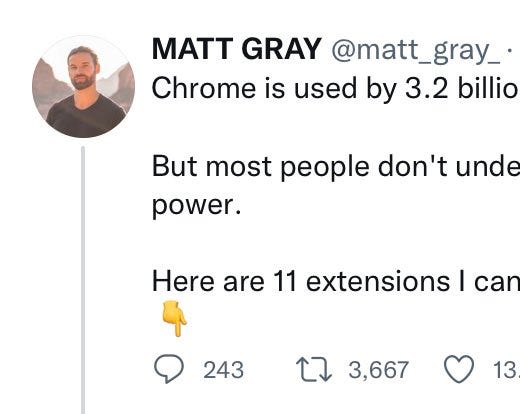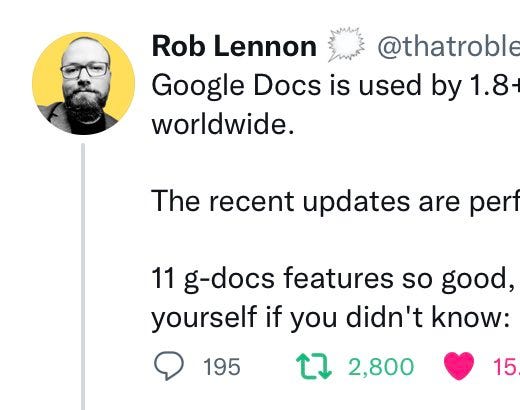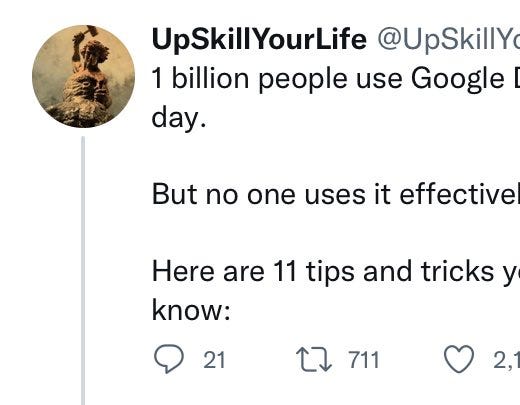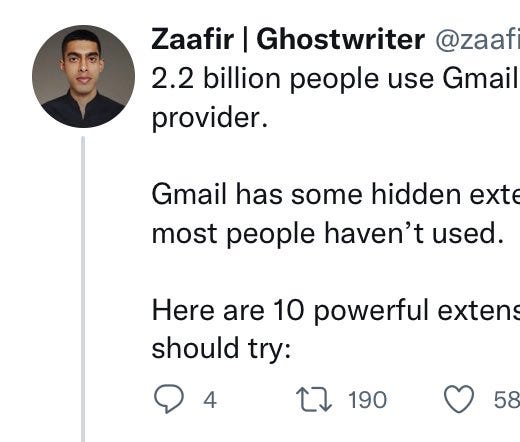The Long Game 114: CO2 Monitoring, The Hypocrisy of Elites, Morale, Only the Paranoid Survives
🏦 How does the Youtube Creator Economy Works, Childcare Science, Arab Superstates, Doing You, All Trails, SBF Interview, and Much More!
Hi there, it’s Mehdi Yacoubi, co-founder at Vital, and this is The Long Game Newsletter. To receive it in your inbox each week, subscribe here:
💌 We’re inviting more and more people to Vital. Do you own an Apple Watch, a Garmin, an Oura ring, or something else? Let me know:
In this episode, we explore:
CO2 monitoring
The hypocrisy of elites
Doing you
Morale and building
Only the Paranoid Survives
Childcare
Let’s dive in!
🥑 Health
💨 CO2 Monitoring
Nothing lengthy this week, I just wanted to share the idea that CO2 monitoring will become mainstream, and we’ll all benefit from it.
Poor air quality is an under-reported problem affecting most of us living in big cities and polluted air, and breathing too much CO2 can impair our thinking.
Many papers show this:
Here’s an interesting research paper showing how air quality impacts cognitive performance:
The results show that poor indoor air quality hampers cognitive performance significantly. We find that an increase in the indoor concentration of fine particulate matter (PM2.5) by 10 μg/m3 increases a player’s probability of making an erroneous move by 26.3%.
And here’s another one:
Applying methods of textual and stylometric analysis to all 119,225 speeches made in the Canadian House of Commons between 2006 and 2011, we establish that air pollution reduces the speech quality of Canadian Members of Parliament (MPs).
Exposure to fine particulate matter concentrations exceeding 15 μg/m3 causes a 3.1 percent reduction in the quality of MPs speech (equivalent to a 3.6 months of education). For more difficult communication tasks the decrement in quality is equivalent to the loss of 6.5 months of schooling.
Interestingly, Vitalik already carries his CO2 monitor with him all the time:
This contains a combination of various life-extension medicines (metformin, ashwagandha, and some vitamins), and covid defense gear: a CO2 meter (CO2 concentration minus 420 roughly gives you how much human-breathed-out air you're breathing in, so it's a good proxy for virus risk), masks, antigen tests and fluvoxamine.
To study air quality in more detail, pair these with:
🌱 Wellness
🤡 The Hypocrisy of Elites
I wondered where to place this excellent piece on the hypocrisy of elites, and because the messages elites push are so detrimental to our wellbeing, it found its place in this section.
I started thinking about this topic after listening to Marc Andreessen talk about how elites push the body positivity message while doing the complete opposite on a personal level.
“The elites most committed to personal fitness are the most adamant that they should send a cultural message to the masses saying it doesn’t matter.”
Erik Torenberg perfectly summarized this idea in his piece.
People want egalitarianism when they’re being selected, but they’re elitist when they’re doing the selecting.
When people seek a job, partner, or doctor, they do not seek the average job, partner, or doctor — they seek the best.
This is the ultimate luxury belief: wanting average for everyone else while wanting the best for ourselves. We see this everywhere: Elites advocate for public schools that disavow gifted programs for the poor while simultaneously sending their own kids to fancy private schools with gifted programs galore. Elites advocate for defunding the police while living in gated communities with private security. Elites throw a fit about getting homeless people off the streets, while moving to neighborhoods where they will never see any homeless people.
Not only do they advocate for egalitarianism for others while pursuing elitism for themselves, elites also recommend practices for others that they themselves don’t follow. This isn’t just hypocrisy; it’s pulling up the ladder.
Rob Henderson quotes a study that showed that individuals with higher income and/or social status were the most likely to say that success comes as a result of luck and connections as opposed to hard work. Meanwhile, low-income individuals were much more likely to say success comes as a result of hard work and individual effort.
“This is where the hypocrisy comes in: affluent people often broadcast how they owe their success to luck. But then they tell their own children about the importance of hard work and individual effort.”
Again, we see this everywhere: elites promote body positivity — the idea that being overweight is healthy — while being most obsessed with maintaining perfect health. Elites promote sexual independence and polyamory, yet themselves are most likely to be monogamous in stable long-term relationships. Elites complain about overpopulation and carbon footprint, but they’re the ones having the most kids and inflicting the largest carbon footprint. The Last Contrarian twitter account summarizes this well.
🧠 Better Thinking
👉 Doing You
I called this newsletter The Long Game in opposition to short-term thinking. You can witness short-term thinking in many places, but one area where it’s increasingly visible is on social media. If you’re on Twitter, you must have seen the explosion of clickbait, useless threads rehashing some useless information in a way that the algorithm favors.
The crazy thing is that, at first, it seems to be working very well. People like this content and share it. So what’s the catch? The catch is that it doesn’t accomplish what the author initially intended. I really liked this article because it clarifies a critical element of an online presence.
If you are actively following the “viral” playbook so many people can’t resist using to make posts that look like this, you need a digital intervention of sorts…people have been copy-pasting posts like this for years to try to mindlessly bait for attention:
Using growth hacks is essentially creating a digital Potemkin village. If unfamiliar with the concept…
A "Potemkin village" signifies any deceptive or false construct, conjured often by cruel regimes, to deceive both those within the land and those peering in from outside.
In politics and economics, a Potemkin village is any construction (literal or figurative) whose sole purpose is to provide an external façade to a country that is faring poorly, making people believe that the country is faring better.
This is all a big tapestry of misunderstanding the social proof that actually matters, because it’s so easy now to game the parts that don’t. I’ve gone through this in detail for companies but it all applies to individuals too.
What I’m seeing more of lately: everyone’s trying to be a ‘growth hacker’ or otherwise game algorithms for ‘engagement’
It’s key to remember that the cheap algorithmic wins and the viral threads don’t matter in the long run. That’s not the type of interaction that will be the most valuable.
I hope that the algorithms will stop promoting that type of cheap content or that new social networks will replace the current ones with better-curated feeds (😉)
⚡️ Startup Stuff
🧠 Morale and Building
Vitalik tweeted this recently:
It made me think of the importance of morale for any type of accomplishment, whether personal or in a team.
I think this aspect is really underrated in the context of building a company. While building something, you’re bound to have problems & challenges constantly, so a team with the right mindset when approaching those constant hurdles will have a greater chance of succeeding. This isn’t a fact (that I know of at least) but an idea I strongly believe in.
We all know people who are sources of insane energy, immediately thinking of solutions as soon as a problem arises, and people who are energy-draining, making problems seem bigger.
In the context of a startup, inherently more subject to constant challenges, you want a team with the right mindset regarding this.
📚 What I Read
💀 Only the Paranoid Survives, by Andrew Grove
I always wanted to pick up this book, as I’m naturally someone who agrees with the title!
Some interesting ideas from the book:
Whenever there’s a change in the market, companies have to reevaluate their strategies
All employees should be prepared for such critical situations, as jobs are often endangered at these moments
Strategic inflection points can lead a company either to catastrophe or a new chance for success
Strategic inflection points can confuse a business, so strong leadership is needed to ensure companies remain focused and relevant.
In large companies, it’s the CEO who must have a clear vision of the company’s future. They have to communicate their vision clearly and constantly, as failure to do so can have negative consequences.
For internal and external employees to follow a new strategy, companies must transmit a clear and simple message
Since employees are emotionally attached to their company, leaders must solicit objective opinions from outsiders
Companies need to build flexible teams of creative staff who are comfortable with change
Business conditions can change in an instant, so companies must be vigilant and prepared for multiple scenarios
Managers and employees of companies should prepare themselves for the inevitable moments of crisis that occur in a company’s life. These strategic inflection points can be not only overcome but also exploited for the company’s good.
✋ Don’t Surround Yourself with Admirers
Instead, befriend people who inspire awe in you.
When you’re admired and well known, “people are always nice to you,” the actor Robert De Niro once confessed to Esquire magazine. “You’re in a conversation, and everybody’s agreeing with what you’re saying.” Sounds great! Agreement makes life smooth, and the praise and esteem of others gives us pleasure, even stimulating a reward center in our brain. Wanting to surround ourselves with admirers, if we can, is only natural.
But in his interview, De Niro clarified exactly what a life filled with admirers can mean. Admirers agree with you “even if you say something totally crazy.” And that’s bad: “You need people who can tell you what you don’t want to hear,” he said. In other words, the admiration of others can be a double-edged sword. Being admired for our accomplishments is pleasant, but it can also inflame our vanity and distort reality in ways that leave us worse off in the end.
Pair with: The Big Man Mechanism: how prestige fosters cooperation and creates prosocial leaders
It is particularly noteworthy that prestige status shapes social life and provides a foundation for informal leadership in groups possessing a variety of social norms and practices that otherwise actively suppress status differences, and where any substantial accumulation of material wealth is impossible. In the Kalahari, for example, individuals that begin to accumulate more than a couple of hunting successes in a row take time off to avoid the envy of others. Credit for hunting success is further diffused by sharing arrowheads, and assigning the ownership of a kill to the owner of the arrowhead instead of the hunter. And, famously, the hunter's band actively ‘insults' the quality of his kills to deflate his pride and ‘cool his heart’
👶 Childcare: what the science says
An interesting piece on childcare:
Summary of effects
First, here are the effects of 15–30 hrs of daycare a week, broken down by age.
For ages 3+, there are few downsides and substantial advantages. Daycare boosts both cognitive skills (literacy and mathematics) and social skills as measured in the first few years at school.
For age 2, the findings are more mixed. This is the best age to start in terms of boosting later cognitive skills, but children are more likely to act out and be angry when they reach school.
For age 1, childcare may improve cognitive skills a little, though certainly less than starting at age 2. But it also has even larger negative effects on later behavior in school. There is no boost to social skills.
For children aged 0–12 months, daycare likely damages cognitive skills and children’s later behavior at school is even worse. There is no boost to social skills.
🎙 Interview of SBF
How SBF identifies talent
Dwarkesh Patel 28:30
You've talked about how you weigh experience relatively little when you're deciding who to hire. But in a recent Twitter thread, you mentioned that being able to provide mentorship to all the people who you hire is one of the bottlenecks to you being able to scale. Is there a trade-off here where if you don't hire people for experience, you have to give them more mentorship and thus can't scale as fast?
Sam Bankman-Fried 28:51
It's a good question. To a surprising extent, we found that the experience of the people that we hire has not had much correlation with how much mentorship they need. Much more important is how they think, how good they are at understanding new and different situations, and how hard they try to integrate into their understanding of coding how FTX works. We actually have by and large found that other things are much better predictors of how much oversight and mentorship they’re going to need then.
🍭 Brain Food
🏗 If I Could Do It, So Can They: Among the Rich, Those With Humbler Origins are Less Sensitive to the Difficulties of the Poor
I found this paper very interesting: among the rich Americans, those with humbler origins are less sensitive to the difficulties of the poor.
The abstract:
Americans venerate rags-to-riches stories. Here we show that people view those who became rich more positively than those born rich and expect the Became Rich to be more sympathetic toward social welfare (Studies 1a and b). However, we also find that these intuitions are misguided.
Surveys of wealthy individuals (Studies 2a and b) reveal that, compared with the Born Rich, the Became Rich perceive improving one’s socioeconomic conditions as less difficult, which, in turn, predicts less empathy for the poor, less perceived sacrifices by the poor, more internal attributions for poverty, and less support for redistribution.
Corroborating this, imagining having experienced upward mobility (vs. beginning and staying at the top) causes people to view such mobility as less difficult, reducing empathy and support for those failing to move up (Study 3). These findings suggest that becoming rich may shift views about the poor in ways that run counter to common intuitions and cultural assumptions.
🎥 What I’m Watching
❓ Why is there no Arab Superstate?
An interesting deep-dive explaining why there aren’t any Arab superpowers.
🏦 How does the Youtube Creator Economy Works?
Although short videos are all the rage right now, it seems longer formats are still the best choice for monetization.
🔧 The Tool of the Week
🏔 All Trails
Continuing my exploration of vertical social networks, this week I tried All Trails, a tool and social network focused on hiking. If you’re into hiking (which I’m not really), you’ll enjoy this product!
🪐 Quote I’m Pondering
"You are what you do, not what you say you'll do."
— Carl Jung
👋 EndNote
Thanks for reading!
If you like The Long Game, please share it on social media or forward this email to someone who might enjoy it. You can also “like” this newsletter by clicking the ❤️ just below, which helps me get visibility on Substack.
Until next week,
Mehdi Yacoubi











